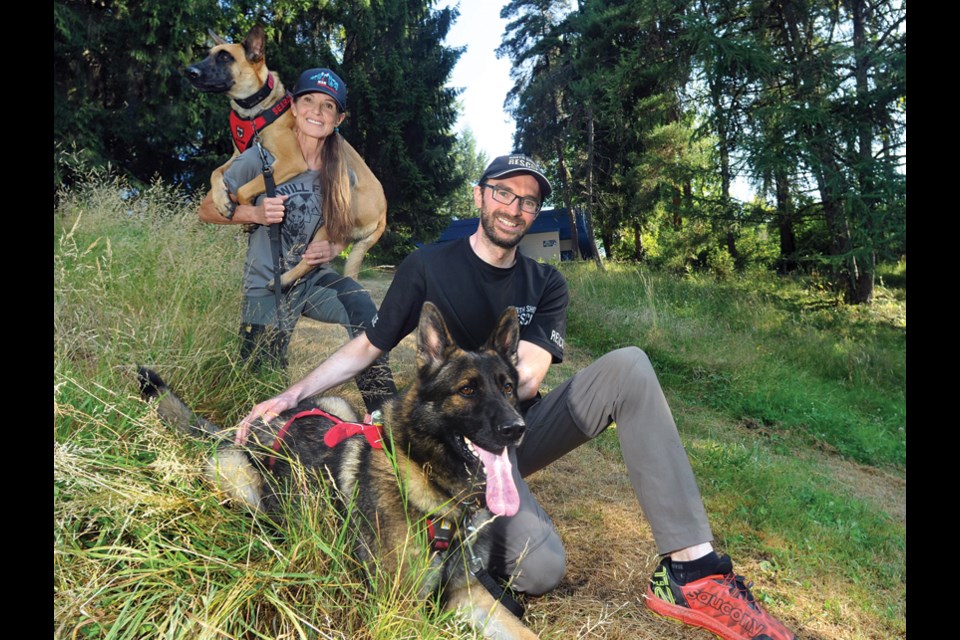North Shore Rescue’s newest recruits are ready to go. And they’re very good pups.
After years of intense training Ryan Morasiewicz’s German shepherd Neiko and Ellie Lamb’s Belgian Malinois Dreki have both now been validated as search dogs, ready to sniff out lost and injured souls in the backcountry.
Morasiewicz, a 10-year North Shore Rescue member, has been training Neiko since 2019 when he washed out of police dog training for being too friendly. Dreki is the second dog Lamb has trained for NSR. She brought the team’s first search dog, Nan, when she joined the team in 2014. Nan retired in early 2019 and died later that year.
Until this month, the team had only one active search dog – Chloe, another Belgian Malinois trained by North Shore Rescue veteran Roger Bean.
Unlike a typical family pet, search dogs are in some form of training all the time, Lamb said.
“Everything about these dogs from scratch is being honed in for a particular task. …Whether it's obedience, whether it's socializing, whether it's on tracking, whether it's helicopters, whether it's rappelling,” she said. “However old the dogs are, they've been working their butts off for that time.”
Since they were pups, Neiko and Dreki have learned, bit by bit, to pick up human scents in the air and follow them to their source. For every successful find, they’re rewarded with praise and a quick play session with their favourite toy. Even when it’s a matter of life and death, to the dogs, it’s all a game, Morasiewicz said.
The B.C. Search Dog Association says it should take about two years and 2,000 hours to train a search dog, over and above the usual obedience and housebreaking. It’s a massive personal expense and time commitment, and it wouldn’t be possible without a lot of support from NSR, the RCMP, and their families, both Morasiewicz and Lamb agreed.
Their handlers also have to get them some neat gear, including harnesses that can be rigged to a helicopter long line, GPS units that show exactly where they are and everywhere they’ve been, and goggles to help protect their eyes in the bush.
On validation day, the dog and handler are assessed as a team on everything from basic obedience to a practical test in which they have 90 minutes to find three hidden objects and a hidden person across a 500-metre by 500-metre swath of terrain.
The handler is judged on how well they plan the search – making sure they’ve set up a proper grid and accounted for environmental conditions like wind, but also they’re watched closely to make sure they pick up every indication their dog gives, which could be as subtle as a nod of the head.
And the dogs are so unique, another handler wouldn’t be able to sub in for Morasiewicz or Lamb.
Neiko and Dreki both passed their validation tests in July.
“I just didn’t want to let him down because he knows what to do,” Morasiewicz said.
In his downtime, Neiko is an idyllic family dog who likes to nap and chew his toys, Morasiewicz said. Dreki, meanwhile, has an overabundance of energy.
“She's got a great sense of humour and she definitely needs management. I wouldn't say that there's a lot of off time with her right now,” Lamb said. “She's like having a two-year-old and never going through pregnancy.”
With Neiko and Dreki’s validation, there are now just 20 search dogs in the province.
They’re going to be especially helpful when it comes to seeking out subjects who are not responsive.
“Regular searching makes it exceedingly more difficult for you,” Morasiewicz said, noting you need a small army of people to fan out over a large grid. “Which is incredibly time and labour intensive. And you rely on your eyes. … A dog can clear a decently sized area relatively quickly and quite effectively.”
North Shore Rescue team leader Mike Danks said he is incredibly grateful to have Neiko and Dreki joining the team.
“I think we're in such an amazing place right now because we have three certified search dogs on our team that are providing coverage here on the North Shore, and also more broadly to mutual aid,” he said. “It's more tools in the toolbox to provide that support for our community. And the more tools we have, the more capable our team is to respond to any type of incident.”
Beyond that, the dogs come to feel like family for a SAR team, Danks said.
“The benefits are huge, even for the mental health of our responders. Just having those dogs around, whether they're working at the time or not, it lifts people up,” he said.
It’s only a matter of time now before Neiko and Dreki are called up for the real thing. While rescue volunteers are never looking forward to someone being lost or injured in the backcountry, Lamb said, they are looking forward to a chance to help.
“We work hard and it would be really an amazing opportunity to make a difference to a family or to the individual we find. That's what we're hoping for,” she said.
All Neiko and Dreki will ask in return is a scratch behind the ears and a good game of tug.



